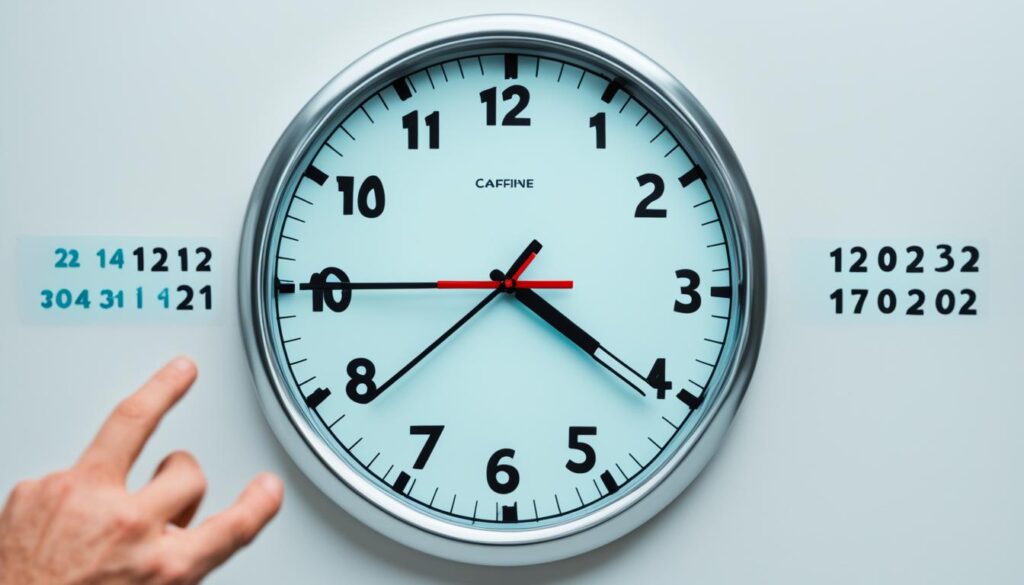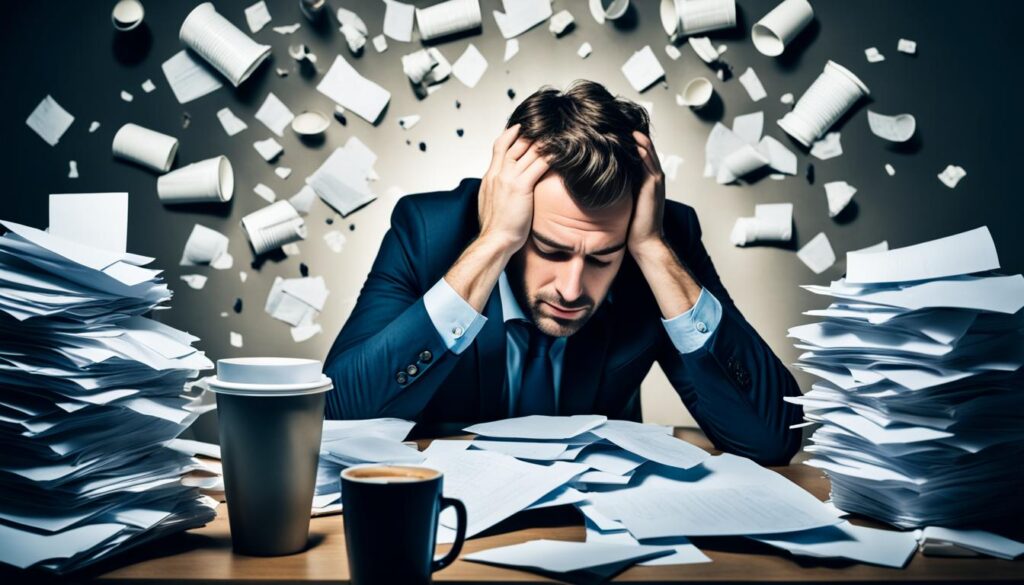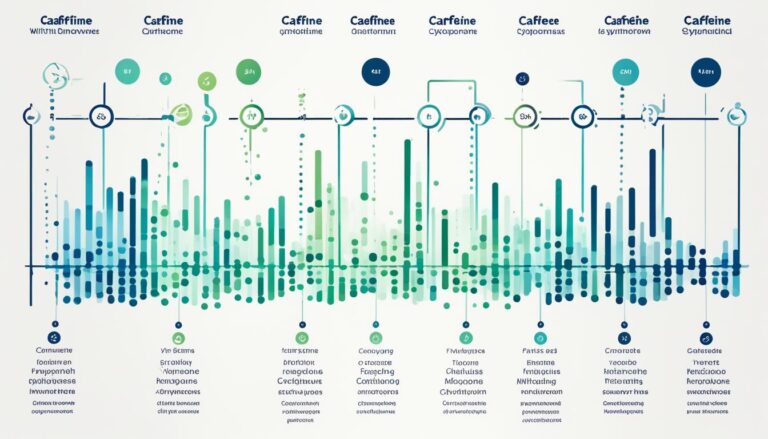Caffeine is a widely used stimulant that helps people feel more alert and energetic. But when someone who drinks coffee daily stops suddenly, they might feel bad. They could have symptoms that affect how they feel both physically and mentally. Knowing about the caffeine withdrawal timeline is key for those thinking of cutting down or quitting. It helps set clear expectations for when and how long symptoms will last.
This article will cover the basics of caffeine withdrawal. We’ll talk about what causes these symptoms, how long they last, and ways to make them easier to handle. With this knowledge, people can better understand their feelings and make the transition easier.
Key Takeaways
- Caffeine withdrawal symptoms typically begin within 12 to 24 hours after stopping.
- The peak of symptoms generally occurs between 24 and 51 hours post-withdrawal.
- Symptoms may last anywhere from 2 to 9 days, varying in intensity depending on individual consumption levels.
- Common symptoms include headaches, fatigue, anxiety, and mood changes.
- Managing withdrawal can be facilitated by gradually tapering caffeine intake.
Understanding Caffeine Withdrawal
Caffeine withdrawal happens when people stop or reduce their caffeine use. This leads to the body getting used to more caffeine, changing how it works. The brain starts to need caffeine to feel normal. When caffeine is stopped, the brain has trouble adjusting, causing caffeine withdrawal symptoms.
Symptoms usually start within 12-24 hours after stopping caffeine. The worst of these symptoms hit around 20-51 hours. By the first week, most people start to feel better. But, those who drank a lot of caffeine might feel bad for longer.
People often get headaches, feel tired, irritable, and have flu-like symptoms. Some might feel anxious or sad. These symptoms can make people feel worse overall. It’s important to understand how caffeine affects us to manage it better.
What Causes Caffeine Withdrawal?
Caffeine withdrawal happens when the body gets used to having caffeine. Caffeine blocks the sleepy feeling caused by adenosine. Over time, people who use caffeine a lot have more adenosine receptors. This makes them dependent on caffeine.
When they stop using caffeine, they feel bad because of too much adenosine. This can lead to headaches, feeling irritable, and being very tired.
How bad the withdrawal is can depend on many things. This includes your genes, how much caffeine you used to drink, and how long you used it. People who drank a lot of caffeine might feel worse than those who didn’t.
Stopping caffeine use too quickly makes symptoms worse. It’s better to slowly cut down to make it easier.
Caffeine can make you feel better by improving your mood and energy. But too much can harm your mental health. It’s important to use caffeine in moderation to avoid feeling anxious or very tired.
To learn more about how caffeine affects mental health, check out this article here.
Caffeine Withdrawal Symptoms
Many people who drink caffeine daily might feel bad when they try to cut back or stop. These feelings can start within 12 to 24 hours after the last caffeine hit, and they get worse around 20 to 51 hours. Over 50% of people who stop drinking caffeine say they get a headache, which feels like a migraine.
People who drink a lot of caffeine or take supplements are more likely to feel these effects. These symptoms can last from 2 to 9 days. They include:
- Headaches
- Nausea
- Fatigue during withdrawal
- Irritability
- Muscle pain
- Difficulty concentrating
Stopping caffeine can make you feel really tired and affect your daily life. It can be hard to focus, making it tough to get things done. If you have headaches, you might find relief with pain relievers like aspirin or ibuprofen. Some studies even suggest that decaf coffee could help because of its placebo effect.
Knowing about these symptoms can help you prepare for cutting down on caffeine. It lets you plan and find ways to deal with the discomfort as you change your habits.
How Long Does Caffeine Withdrawal Last?
The time it takes to get over caffeine withdrawal is usually 2 to 9 days. People react differently based on their body and how much caffeine they used to drink. Symptoms start within 12 to 24 hours after stopping caffeine. Headaches and feeling tired are common first signs, and they get worse between 20 to 51 hours.
Knowing how long caffeine withdrawal lasts is key for those trying to cut down or stop. About half of people going through withdrawal will have headaches. For regular drinkers, feeling tired can start as early as 16 hours after stopping, and it gets worse as time goes on. Symptoms usually start to go away after they reach their peak, giving people some relief.

Many things affect how long caffeine withdrawal lasts, like how much caffeine you used to drink and your genes. Experts suggest slowly cutting down on caffeine instead of quitting cold turkey. Drinking plenty of water can help with headaches and nausea, which come with withdrawal. If you’re finding it hard, trying decaf green tea might help while you’re quitting caffeine.
Even though withdrawal symptoms don’t last long, if they don’t go away or are too bad, you should see a doctor. For tips on dealing with tiredness from these changes, check out info on health issues and lifestyle adjustments.
Timeline of Caffeine Withdrawal Symptoms
When you stop or cut down on caffeine, the withdrawal timeline starts. Symptoms like headaches, feeling tired, and trouble focusing can begin within 12 to 24 hours. This is the start of the caffeine withdrawal symptoms, which can be tough for regular caffeine users.
As time goes on, the worst of the symptoms hits between 20 to 51 hours after your last caffeine fix. About half of people get bad headaches. Others feel very tired, sleepy, grumpy, and can’t focus well.
By day three, symptoms start to lessen. By days five to seven, you might feel like yourself again. Getting over caffeine withdrawal can take from two to nine days. Quitting caffeine slowly can make this easier.
Knowing how much caffeine you drink is key. Drinking it often can make you dependent and tolerant, making withdrawal worse. Having a plan to cut down on caffeine can help ease the withdrawal.
| Time Frame | Symptoms Experienced |
|---|---|
| 12 to 24 hours | Headaches, low energy, difficulty concentrating, drowsiness |
| 20 to 51 hours | Peak headache severity, increased tiredness, irritability |
| Day 3 | Symptoms begin to subside, energy levels improve |
| Days 5 to 7 | Significant recovery, most symptoms diminish |
| Days 2 to 9 | Varied symptom duration, complete resolution for many |
Caffeine Withdrawal Timeline: When Will It End?
Knowing the caffeine withdrawal timeline day by day helps people get through the tough times. Symptoms start to show up between 12 to 24 hours after stopping caffeine. This is when people first feel the effects as their body adjusts.
Onset of Symptoms
At the start, symptoms can be mild or strong. Common early signs include:
- Headaches
- Fatigue
- Nausea
- Irritability
- Difficulty concentrating
These symptoms get worse as the body adjusts to not having caffeine.
Peak of Withdrawal Symptoms
Symptoms usually get the worst between 24 to 51 hours. This is a tough time for many, causing more issues like:
| Symptoms | Intensity Level | Duration |
|---|---|---|
| Headaches | High | 1-3 Days |
| Fatigue | Medium | Up to 1 Week |
| Irritability | Medium to High | 1-3 Days |
| Nausea | Low to Medium | 1-2 Days |
By Day Eight, people often feel more balanced and are on the mend. Caffeine withdrawal can last up to nine days. Knowing this timeline helps people set realistic expectations and prepare for what’s to come.
Caffeine Withdrawal Duration
The journey of quitting caffeine can be tough for many. Knowing about caffeine withdrawal duration helps manage expectations and prepare for discomfort. Symptoms start 12 to 24 hours after stopping caffeine. Most people feel better in a week, but it varies by person.
Expected Duration of Symptoms
Symptoms of caffeine withdrawal usually last 2 to 9 days. They peak 20 to 51 hours after stopping caffeine. If you used a lot of caffeine, symptoms might last up to 21 days, especially headaches. But, slowly cutting down caffeine can make withdrawal milder.
Factors Influencing Duration
Many things affect how long caffeine withdrawal lasts. Your metabolism, how much caffeine you used to drink, and your health matter a lot. If you drank a lot of caffeine, you might feel worse for longer. But, if you cut down slowly, you might feel better faster.
Knowing these factors influencing caffeine withdrawal helps you prepare. It lets you plan how to get through it with less discomfort. This way, you can handle quitting caffeine better and move to a caffeine-free life.
Managing Caffeine Withdrawal Symptoms
Dealing with caffeine withdrawal needs a careful plan to ease symptoms. Gradually cutting down on caffeine is best, letting your body adjust without harsh side effects. It’s key to stay hydrated to fight headaches and tiredness linked to withdrawal. Using over-the-counter pain relievers can also help when you need quick relief.
Effective Caffeine Withdrawal Remedies
Eating well is key to feeling good. Foods that fight fatigue can boost your energy and help your brain work better during this change. Start your day with a nutritious breakfast to boost your mood and energy. Getting enough sleep helps with caffeine withdrawal and aids in recovery. Regular exercise can increase serotonin, which helps your mood and reduces tiredness.
Coping Mechanisms for Common Symptoms
Relaxation techniques like yoga or deep breathing can help with caffeine withdrawal. These methods reduce stress and keep your mind clear, making it easier to handle mood swings. The article on morning energy offers more tips to fight fatigue and increase productivity. Doing things you enjoy can also help improve your mental health during this tough time.

Headaches and Caffeine Withdrawal
Caffeine withdrawal headaches are common when people cut down or stop drinking caffeine. Just one small cup of coffee a day can lead to dependency. Symptoms start within 12 to 24 hours after the last caffeine use, getting worse between 20 and 51 hours later. These headaches can last up to nine days, causing a lot of discomfort.
To manage these headaches, you need a good plan. Drinking plenty of water helps ease the pain. Over-the-counter pain relievers like acetaminophen and ibuprofen can also help. But, trying things like peppermint oil or ice packs can be just as good for some people.
Getting enough sleep is key to feeling better. Keeping a food diary helps track caffeine intake and find non-caffeinated drinks like herbal teas or flavored water. Cutting caffeine slowly, by 25% each week, can make quitting easier.
The International Headache Society says a caffeine withdrawal headache is a throbbing pain that starts within twelve hours of stopping and usually goes away in a week. Having a plan that includes staying hydrated, eating well, and resting helps manage these headaches. Sticking to these habits can lessen withdrawal symptoms and improve your health.
For more tips on fighting fatigue and boosting energy, check out effective strategies that focus on health.
Fatigue and Energy Levels During Withdrawal
Feeling tired when you stop drinking caffeine is common. Caffeine helps keep you awake and full of energy by blocking adenosine receptors. Without it, you might feel more tired and have less energy.
Withdrawal symptoms can last from 2 to 9 days, with tiredness often getting worse right after you stop. You might start feeling these symptoms within 12 to 24 hours after your last caffeine drink. It can be hard to keep your energy up without caffeine, but there are ways to make it easier.
To fight fatigue, try these tips:
- Prioritize Sleep: Get good sleep to help your body recover.
- Nutrition: Eat balanced meals with whole foods to keep your energy up.
- Light Physical Activity: Do some light exercise, like walking, to improve blood flow and mood.
Genetics can affect how your body handles caffeine, which can change how you feel during withdrawal. A study in 2014 showed that genetics play a part in how people react to caffeine. Some folks might find that decaf drinks help ease their symptoms without missing the coffee too much.

| Strategies | Benefits |
|---|---|
| Prioritize Sleep | Restores energy and improves mood. |
| Nutrition | Provides essential nutrients, stabilizing blood sugar levels. |
| Light Physical Activity | Enhances mental clarity and helps in combating tiredness. |
Using these strategies can help you manage your energy without caffeine. The first part might be tough, but taking care of yourself is key to getting through it.
Strategies to Minimize Withdrawal Symptoms
Using strategies for minimizing caffeine withdrawal can make quitting easier. One key method is to slowly cut down on caffeine. This helps your body adjust, making withdrawal symptoms less severe.
It’s important to have a plan to reduce caffeine. Try cutting back by 10% every two weeks. This gradual decrease can make withdrawal effects less intense. Drinking herbal tea instead of regular coffee can also help. And, staying hydrated is key to feeling good during this time.
Getting enough sleep is crucial when you’re quitting caffeine. Bad sleep can make you feel tired and cranky. Getting enough rest can clear your mind and improve your mood. Trying relaxation techniques like meditation or light exercise can also help you feel calm.
Everyone is different, so finding what works for you is key. Doctors can offer advice on how long it might take to detox and what you can do to help yourself. For more tips on handling anxiety and lifestyle changes, check out this resource. It shares ways to boost your mental strength.
Conclusion
Knowing the caffeine withdrawal timeline is key for those wanting to reduce or stop caffeine. Symptoms start within 12 to 20 hours after the last caffeine use, peak around two days, and can last up to a week. Since 80 to 90 percent of North American adults drink caffeine daily, many will face discomfort when cutting back.
The withdrawal process can be tough, but it’s doable with the right plan and coping methods. By slowly switching to decaf or non-caffeinated drinks, the transition gets easier. Studies show this gradual method helps lessen symptoms like headaches, which hit about half of caffeine users during withdrawal.
With the right awareness and strategies, people can get through caffeine withdrawal and improve their health. It’s all about learning and using effective ways to deal with this common issue.


